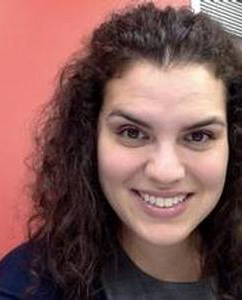English
Quick Links:
- Pathos and the Moral Imagination in ENGL 205: "Passing and Performing Identity"
- Still Weaving of a Written Self: Reflections on the Whole Student
- Writing as Social Action: Writing for the Greater Good in the Jesuit Tradition of Eloquentia Perfecta
- Reading and Writing within the Sphere of Ignatian Discernment: Social Justice, Society and Ourselves
- Studies in Fiction
- Critical Reflections: Ignatian Pedagogy, Online Course Design, and Literature of the End of the World
- English Senior Seminar: The Early Modern Idea of Work (ENGL 499)
- Literature and the Moral Imagination: Focus on Marginalized Voices and Borderlands
Mapping Xavier's Campus - Reading with Heart and Mind, the Problem: Integrating Students? Affective Responses to Literature into Literature Courses
- Mercy's Looking Glass: Ignatian Spirituality through the Lens of Pilgrim's
- Parent-Education in a Montessori Lab School: Picture Books, Lectio Divina and the Daily Examen
- Sex, Solitude, and Single Life
- Discernment, Orienteering, and the Education of Desire: Practical Guidance for Making Decisions
- From Manresa to Oxford: Identifying the Ignatian Vision in Twentieth-Century British Literature - Literature and the Moral Imagination English Senior Seminar
Pathos and the Moral Imagination in ENGL 205: "Passing and Performing Identity"
Jennifer McFarlane Harris, Ph.D.
Mentor: Kristine Suna-Koro, Ph.D. (Theology)

The summer before beginning the Ignatian Mentoring Program, I faced a challenge: delivering my ENGL 205: Literature and the Moral Imagination course online. I had already successfully taught this course with the theme of “Passing and Performing Identity,” having students read texts that explore the phenomenon of racial passing in the United States, whereby “black” persons light-skinned enough to appear “white” cross the color line to live as white people. But I was concerned about adapting this complex theme for the online environment while still retaining the flavor of a Xavier signature course (part of the Ethics and Religion in Society triad) and the student learning goals for the Diversity Flag and the Gender and Diversity Studies designation. The course is designed to integrate approaches and artifacts from multiple disciplines to enhance our reading of literature as we ask big questions: How could someone be “born into” one race and then live life as another race? Is racial identity fixed or fluid? Natural or cultural? And why do Americans conceive of race according to a black/white binary?
Read full text of "Pathos and the Moral Imagination in ENGL 205: 'Passing and Performing Identity'"
Back to Top
Still Weaving of a Written Self: Reflections on the Whole Student
Kelly Austin , M.A.
Mentor: Trudelle Thomas, Ph.D. (English)
I turned around to survey the classroom one last time, checking to make sure I'd left nothing behind. As I went to switch off the lights, I stood there, briefly, taking in the silence. Here I stood immediately after the final, and I was already missing their voices. As a writing instructor, this is nothing new: I spend the entire semester "listening" to my students' voices--in journals, in papers, in emails, in classroom discussions, in individual conferences, and even in the informal spaces before and after class. So at the end of the semester, it should come as no surprise that the sudden ceasing of all these voices leaves such a void.
This school year I had spent so much time cultivating those voices, searching out those voices, that the silence seemed that much more stark. This year verified for me the real need, the real thirst, the real hunger our students have for understanding--of the self, of the world around them. In fact, my students were so eager to use their voices as a means of exploration--not just of their academic selves, but of their whole selves--that encouraging that expression, and hence understanding, through language was relatively effortless. And that understanding of the self is what a college education, particularly a Jesuit education, is all about--or at least it should be. But this year, more than any other, I have become aware of how much we are failing our students, of how much we separate our students' intellectual selves from their whole selves, their souls. And we all suffer as a result.
Read the full text of "Still Weaving of a Written Self: Reflections on the Whole Student"
Back to Top
Writing as Social Action: Writing for the Greater Good in the Jesuit Tradition of Eloquentia Perfecta
Renea Frey, PhD
Mentor: Chris Pramuk, PhD (Theology)
As a new faculty member at Xavier in the fall of 2015, I was intrigued by the Manresa program and wanted to continue exploring the parameters of Jesuit education through the Ignatian Mentoring Program. My goals for this interaction were twofold: first, to educate myself more fully on the Jesuit tradition and to find my place within it, and secondly to integrate Jesuit principles into a new course I was designing and teaching for the Spring of 2016.
I was excited about many aspects of my new job as an Assistant Professor of English and Writing Program Director at Xavier, but was perhaps the most inspired by the prospect of working and teaching in an environment that supported my most deeply held values. At Xavier, rather than being peripheral to my teaching, values such as reflection and working for the greater good in the service of justice and love were central. This was an idea that was very gratifying to me, and I was very grateful that the Igantian Mentoring Program was there to support this work.
Reading and Writing within the Sphere of Ignatian Discernment: Social Justice, Society and Ourselves
Jacki Lyon, MHPA, M.Ed.
Mentor: Trudelle Thomas, Ph.D. (English)
Abstract
The purpose of the Jesuit Mentorship Program is to develop a deeper understanding of the Ignatian vision and Jesuit education in the Xavier community. Jesuit ideals were integrated into each course through an emphasis on social justice issues. The Ignatian philosophy was incorporated into Professional Writing through a major proposal that addressed a single social justice issue on Xavier's campus: student access to mental health services through McGrath Health and Wellness Center. Considering classical and contemporary works in Literature and the Moral Imagination, students travelled through the Spiritual Exercises to: reveal their own inner landscape, identify what living in the Ignatian spirit means, draw clarity during times of desolation, and ultimately seek inner joy in concert with the Ignatian vision. Reading and writing assignments in English Composition focused on contemporary social justice issues so students could begin to assess themselves in relation to God and to our global community.
Studies in Fiction
Anne McCarty, M.F.A.
Mentor: Trudelle Thomas, Ph.D. (English)
For the Ignatian Mentoring program, Trudelle Thomas and I taught a Studies in Fiction (124) class concurrently during the spring semester of 2008. Previously, in the fall, Trudelle introduced me to many Jesuit concepts. The ideas that we felt most drawn to and inspired by included: "Discernment;" decision making based on the rational and the emotional; "Cura Personalis," educating the whole student; "Mysterium tremendum," a sense of wonder and exploration. It was incredibly freeing to know that discussions I'd been having in class, ones a part of me considered tangential, were actually central to the work, and mission, of a professor at a Jesuit institution. Now, when spiritual or personal issues arise in class, I feel more empowered to engage these subjects and have a more complete vocabulary to approach these subjects.
Read full text of "Studies in Fiction"
Critical Reflections: Ignatian Pedagogy, Online Course Design, and Literature of the End of the World
Megan Nieto, Ph.D.
Mentor: Jennifer Tighe (Communication Arts)
Background: Reflections on Ignatian Values in the Context of Mentoring Relationships
In the Fall of 2019, my first semester as a Xavier University faculty member, I had the opportunity to join the Ignatian Mentoring Program and the privilege of learning from, collaborating with, and building community and camaraderie with my Ignatian mentor Jenny Tighe. At our lunch meetings, we discussed Ignatian pedagogy and Jesuit values; our teaching interests, challenges, and useful strategies; and perhaps most importantly, our backgrounds, families, passions, and lives. Once assigned online classes for the Summer and Fall of 2020 as part of my maternity leave package, Jenny also shared her expertise and experiences teaching in online environments. We began to focus on integrating Ignatian pedagogy in an online learning environment. Jenny’s emphasis on knowing and caring for the whole person, on reflection, and on solidarity and kinship at our lunch meetings helped set the stage for my online course design that similarly privileges these Ignatian values.
English Senior Seminar: The Early Modern Idea of Work (ENGL 499)
Kara Northway, Ph.D.
Mentor: Sarah Melcher, Ph.D. (Theology)
Course Information
According to Communal Reflection on the Jesuit Mission in Higher Education: A Way of Proceeding (Jesuit Conference, 2002), the first characteristic of Jesuit Higher Education is "Dedication to Human Dignity from a Catholic/Jesuit Faith perspective" (4). Pope John Paul II identified the source and expansion of human dignity as work. In On Human Work, he wrote, "Work is at the center of the social question, the key to making life more human." My English 499 Senior Seminar, subtitled "The Early Modern Idea of Work," sought to explore the ways in which many of our current attitudes toward work and workers were shaped by the drama and culture of the Renaissance, especially that of Shakespeare and his contemporaries.
Read full text of "English Senior Seminar: The Early Modern Idea of Work"
Literature and the Moral Imagination: Focus on Marginalized Voices and Borderlands
Mapping Xavier's Campus
Niamh J. O'Leary, PhD
Mentor: Rachel Chrastil, PhD (History)
From Ignatian Mentoring to Ignatian Pedagogy 
I was fortunate to join the Ignatian Mentoring Program in the semester before I began teaching in English 205: Literature and the Moral Imagination. I knew that the IMP experience would be extremely helpful as I developed a course as part of Xavier's Ethics/Religion and Society Program. I wanted to create a Literature and the Moral Imagination course that would reflect the traditions of Ignatian pedagogy and the values associated with Xavier's Jesuit identity. On the E/RS Program's home page, I found the following description:
Reading with Heart and Mind, the Problem: Integrating Students' Affective Responses to Literature into Literature Courses
Dr. Lisa Ottum, Ph.D.
Mentor: Dr. Kathy Winterman, Ph.D. (Education)

In the 1940s and 1950s, a revolution known as "the new criticism" emerged in America's English departments. Imported from the UK, new criticism was a methodology of reading and teaching literature--especially poetry--that distinguished itself from the "old" critical practices then in place at most institutions. Championed by scholars such as William Beardsley and William Wimsatt, new criticism aimed to assuage several problems that afflicted English departments. One was the perception among scholars outside English that literary studies lacked sufficient rigor. Hoping to lend the study of poetry a more 'scientific' appearance, new critics sought to develop systematic ways of reading and writing about texts. A second problem was the changing student body. Thanks to the GI Bill, an unprecedented number of Americans were enrolling in college. Unlike previous generations of university students, this new cohort was more socioeconomically diverse--and therefore not arriving at college with the same background in literature and languages as their predecessors. New Critics hoped that by arming students with an "objective" set of procedures for reading, they might empower even the most underprepared freshman to read Blake, or Shakespeare, or Keats.
To achieve this ambitious aim, new critics established a number of core disciplinary precepts, many of which remain with us even today. Among these precepts was the notion that a reader's emotional responses to a literary work, while interesting, are not ultimately important to that work's meaning.
Mercy's Looking Glass:
Ignatian Spirituality through the Lens of Pilgrim's Progress
Trudelle Thomas, English
My recent study of Pilgrim's Progress has helped me develop a new way to introduce students to St. Ignatius's Spiritual Exercises. As readers probably know, Ignatius developed his "Exercises" (published in 1548) in Spain as a guidebook for helping others enter more fully into the life of Jesus; it is made up of a series of prompts that help the "retreatant" to imaginatively re-live various episodes in the gospels.  The Exercises are organized into four "weeks" or stages: 1) the invitation to receive divine love; 2) the person and life of Jesus; 3) Jesus' suffering and death; 4) His resurrection and our participation in His ongoing life. Imagining the events of the gospels in this way has helped many people develop a greater appreciation for the Bible. They identify with Jesus and connect his life with their own daily lives, thus developing a more meaningful faith. Originally Ignatius developed these Spiritual Exercises for fellow Jesuits but over time they have been adapted for others. They continue to be popular nearly 500 years later.
The Exercises are organized into four "weeks" or stages: 1) the invitation to receive divine love; 2) the person and life of Jesus; 3) Jesus' suffering and death; 4) His resurrection and our participation in His ongoing life. Imagining the events of the gospels in this way has helped many people develop a greater appreciation for the Bible. They identify with Jesus and connect his life with their own daily lives, thus developing a more meaningful faith. Originally Ignatius developed these Spiritual Exercises for fellow Jesuits but over time they have been adapted for others. They continue to be popular nearly 500 years later.
Parent-Education in a Montessori Lab School:
Picture Books, Lectio Divina and the Daily Examen
Trudelle Thomas, PhD.
Mentor to: Leslie Roth (Montessori)
Abstract: The essay that follows describes two related topics valuable to young parents: reading aloud to children as a form of Lectio Divina (or Divine Reading) and the Daily Examen, two spiritual practices that I find to be especially adaptable to parents of young (pre-school) children and their young (pre-primary) children. Included are twenty guidelines for reading and discussing picture books. The essay will be especially helpful in planning parent-education programs. It is also valuable for parents, educators, and those training future educators, including religious educators.
If you are interested in offering your own parent-education workshops, I would be happy to share workshop materials as I develop them.
Trudelle Thomas
thomas@xavier.edu
Back to Top
Sex, Solitude, and Single Life
- Trudelle Thomas, Ph.D.
Discernment is an Ignatian concept that I continue to find enormously helpful in my teaching. This concept surfaced in a surprising way Spring of 2009 in a new course I taught called "Women of the World." This is a course for upper-level English majors, some of whom are preparing to be secondary English teachers.
For this we read six books (mostly novels) from six different continents (listed below). Novels portrayed women's lives in cultures very different from America, including the UK, Zimbabwe, Afghanistan, Haiti, India, and Poland. Sexual ethics emerged as a central theme in these works. Students encountered new cultural attitudes and behaviors in regard to how women prepare for marriage, the age at which they marry, women without men, and gender roles and sexuality within marriage. Arranged marriages and polygamy also came up, as well as a range of attitudes toward sexual behavior before marriage for both men and women. Students were especially interested in the topic of sexual behavior outside of marriage. The freedom to be single (not married, not "in a relationship") and the freedom to defer sexual activity were two themes that elicited strong student response. (I should mention that the class was made up of 15 females and four males; the females were more vocal on these topics. Most were juniors, seniors, or graduate students between age 20 to 30.)
Read the full text of "Sex, Solitude, and Single Life"
Back to Top
Discernment, Orienteering, and the Education of Desire: Practical Guidance for Making Decisions
Dr. Trudelle Thomas , Ph.D.
During the past school year (2012-13), I was invited to make a presentation on discernment as part of the "Year of Faith" sponsored by Xavier University for the benefit of members of the local and campus community. I drew upon notes and examples that I have used in classes over the years to provide students with practical understanding of how to "discern spirits" when facing choices. I offer the following presentation notes and handout to others who want to introduce the concept in of discernment in a classroom context. My notes include a personal story, while the handout consists of two parts: the numbered "points" that were part of my original talk, and an allegorical 'spiritual map' drawn by my colleague Stephen Yandell to accompany the talk.
From Manresa to Oxford: Identifying the Ignatian Vision in Twentieth-Century British Literature - Literature and the Moral Imagination English Senior Seminar
Stephen Yandell, Ph.D.
Mentor: Gillian Ahlgren, Ph.D. (Theology)
 The Ignatian Mentoring Program gave me the opportunity in fall 2004 to get to know an amazing colleague and new friend, Gillian Ahlgren. In addition to discussing Ignatian spirituality, Jesuit education, and effective pedagogy throughout the year, I used our time reading two useful Ignatian texts, Inner Compass and Teaching as an Act of Faith. From these discussions and readings I chose to make modifications to both of the literature courses I would be teaching in spring 2005: Literature and the Moral Imagination ("Longing and Obsession") and Senior Seminar ("The Inklings").
The Ignatian Mentoring Program gave me the opportunity in fall 2004 to get to know an amazing colleague and new friend, Gillian Ahlgren. In addition to discussing Ignatian spirituality, Jesuit education, and effective pedagogy throughout the year, I used our time reading two useful Ignatian texts, Inner Compass and Teaching as an Act of Faith. From these discussions and readings I chose to make modifications to both of the literature courses I would be teaching in spring 2005: Literature and the Moral Imagination ("Longing and Obsession") and Senior Seminar ("The Inklings").
To provide feedback, please email: jesuitresource@xavier.edu
Jesuitresource.org is developed by The Center for Mission and Identity at Xavier University with support from the Conway Institute for Jesuit Education. Learn more about Jesuit Resource.


